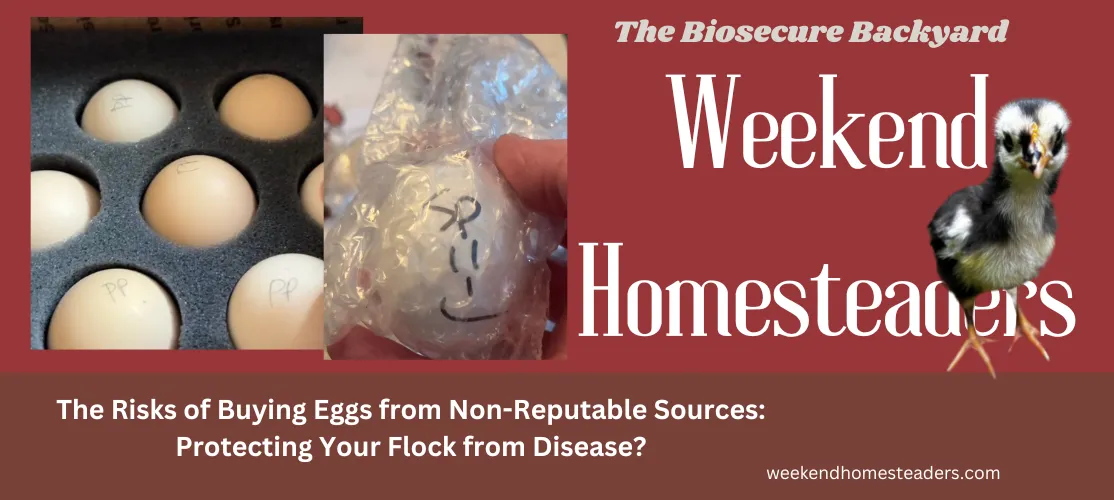
The Risks of Buying Eggs from Non-Reputable Sources: Protecting Your Flock from Disease
When it comes to expanding your flock, the excitement of adding new birds or hatching eggs can sometimes overshadow the potential risks involved. However, buying eggs or chicks from non-reputable sources can introduce serious diseases into your flock, posing a threat not only to your new additions but also to the established birds you’ve worked so hard to care for.
Why Reputable Sources Matter

Reputable breeders take great care to ensure their birds are healthy, well-cared for, and free from disease. They follow strict biosecurity measures, including proper sanitation, vaccination, and health checks, to minimize the risk of disease transmission. When you buy from these sources, you’re investing in the health of your flock and reducing the risk of introducing harmful pathogens.
On the other hand, non-reputable sources may not adhere to the same rigorous standards. They might neglect important health protocols, fail to properly clean and disinfect their equipment, or even sell eggs from sick or poorly managed flocks. This lack of care can lead to the spread of disease, putting your entire flock at risk.
Common Diseases Spread Through Contaminated Eggs
Several diseases can be transmitted through eggs, especially when they come from unsanitary or poorly managed environments. Here are a few of the most common and dangerous diseases that can infect your flock:
Salmonella
Overview: Salmonella is a bacterial infection that can affect both birds and humans. It’s often transmitted through contaminated eggs, either from the egg’s surface or internally.
Symptoms in Chickens: Infected birds may show signs of weakness, loss of appetite, diarrhea, and in severe cases, death. Even if a chicken doesn’t appear sick, it can still carry and spread the bacteria.
Risks: Salmonella can spread quickly through a flock and pose serious health risks to humans who consume contaminated eggs or come into contact with infected birds.
Avian Influenza (Bird Flu)
Overview: Avian Influenza is a highly contagious viral disease that can infect many types of birds, including chickens. While the risk of transmission through eggs is lower compared to other routes, it’s still possible, particularly if eggs come from infected flocks.
Symptoms in Chickens: Symptoms vary but can include respiratory issues, swelling of the head, reduced egg production, and sudden death.
Risks: Avian Influenza can decimate a flock in a short time and has the potential to spread to other animals and humans in rare cases.
Newcastle Disease
Overview: Newcastle Disease is a viral infection that can cause severe illness in chickens. It can be transmitted through the eggs of infected hens, especially if the eggs are not properly handled and disinfected.
Symptoms in Chickens: Symptoms include respiratory distress, coughing, sneezing, decreased egg production, and neurological signs such as tremors or paralysis.
Risks: This disease spreads rapidly and can lead to high mortality rates in unvaccinated flocks.
Mycoplasma
Overview: Mycoplasma infections, such as Mycoplasma gallisepticum, can be transmitted vertically from hen to egg, leading to infected chicks hatching with the disease.
Symptoms in Chickens: Infected birds may experience respiratory issues, swollen sinuses, nasal discharge, and reduced egg production.
Risks: Mycoplasma can spread easily within a flock and is difficult to eliminate once established, often requiring rigorous treatment and management efforts.
How to Protect Your Flock
To safeguard your flock from these and other diseases, follow these guidelines:
Purchase from Reputable Breeders: Always buy eggs or chicks from breeders with a strong reputation for quality and health. Do your research, ask for references, and inquire about their biosecurity practices.
Inspect Eggs Before Incubation: Even if you purchase from a trusted source, inspect eggs carefully before incubation. Look for any signs of contamination or damage, and discard any eggs that seem suspicious.
Quarantine New Additions: If you’re introducing new chicks to your flock, quarantine them for at least 30 days. This practice helps prevent any potential diseases from spreading to your existing birds.
Practice Good Biosecurity: Maintain strict biosecurity measures on your property, including regular cleaning and disinfecting of equipment, controlling access to your birds, and monitoring the health of your flock closely.
Buying eggs or chicks from non-reputable sources is a gamble that can have serious consequences for your flock’s health. By sourcing from reputable breeders and following proper biosecurity measures, you can significantly reduce the risk of disease and ensure that your flock remains healthy and thriving. Remember, a little caution and care upfront can save you from a lot of heartache and loss down the line.
